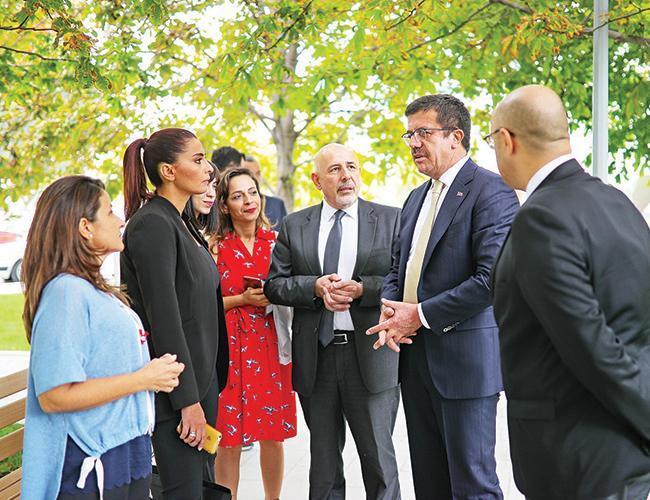
Trade ties between Turkey and Iraqi Kurdistan Regional Government (KRG) should not be affected by the recent independence referendum, Economy Minister Nihat Zeybekci has told the Hürriyet Daily News, saying the current state of economic relations are “business as usual.”
“During the crisis with Russia in 2015, the first thing they did was [restrict] trade. They tried to teach a lesson to Turkey through trade. This was very wrong. I wouldn’t find it right to repeat this mistake in the same way [against the KRG],” Zeybekci said on Sept. 26.
Zeybekci stressed that the cabinet did not take any decisions to impose sanctions on the KRG in its last meeting on Sept. 22, saying that talking about “economic embargos” are dangerous for a country like Turkey that wants to become a regional hub of finance and trade.
“When our national interests oblige us to do otherwise, then we as the Economy Ministry will act accordingly. But our current reflex as a ministry is to make sure that our trade continues with ‘business as usual.’ There was no decision taken at the last cabinet meeting to change this view of ours [regarding trade with the KRG],” he said.
Zeybekci also stated that the cabinet has not decided to close Turkey’s only border gate with the KRG, the Habur border gate.
Trade surplus with Iraq
The trade volume between Turkey and Iraq is currently around $8 billion, $2.5 billion of which is with northern Iraq, the economy minister noted.
The KRG’s current debts to Turkish businessmen stand at around $1.8 billion, while many Turkish nationals do business in northern Iraq, he stressed.
“When you impose an embargo, your trade and exports stop. People may criticize me now saying ‘We talk about Mosul and Kirkuk as sacred causes but you are just talking about trade.’ But my job is trade. I am the economy minister and I have to reflect this side of the coin,” Zeybekci said.
‘We may speedily recover with Germany’
On the rocky relationship between Turkey and Germany, Zeybekci said he expects ties between the two partners to recover following the latter’s recent election.
“I believe this backsliding in Germany will end,” he said, claiming that Berlin acknowledges that its stance with regard to Turkey after July 2016 coup attempt was wrong.
“I think we’ll speedily reach to a point [of good relations] with Germany,” Zeybekci said, adding that he hoped the election results in Germany “awaken German politicians” and help stand up against racism and radical political parties.
“Bashing Turkey and using language against immigrants was very popular during the election campaign. And in the end the center-right and center-left lost votes. I said this to German ministers in my private conversations: Our trade volume is not only $35 billion. Our total trade volume, including the activities of German companies in Turkey and Turkish companies in Germany, exceeds $100 billion,” he said.
The minister denied reports that Germany would impose an economic embargo on Turkey due to poor political ties, but said some restrictions on weapons sales had been observed.
‘EU cannot say no to new Customs Union’
One of the immediate effects of Turkey-German tension has been the suspension of the process to upgrade the Customs Union, but Zeybekci voiced skepticism over this suspension.
“The European Commission, which unanimously suggested expanding the scope of the Customs Union in December 2016, cannot say ‘No, we don’t want it now.’ Upgrading the Customs Union with Turkey will be to the advantage of the EU,” he said.
“The fact that 50 percent of all white goods used in Europe are produced in Turkey and that 80 percent of all vehicles we produce here are sold to Europe creates an interdependent relationship. We are tied to each other. We cannot break so easily,” Zeybekci added.
Visa waiver ‘not likely’
Touching on the long-standing question of a possible visa-waiver being granted for Turkish citizens visiting EU countries, Zeybekci noted that such a waiver should be granted to all Turkish nationals and businessmen considering the large trade relationship.
“We have no visa problem with the EU; the EU has a visa problem with Turkey,” he said.
Tomato exports to Russia
Regarding to ongoing disagreement between Turkey and Russia over the former’s efforts to re-start exports of tomatos to Russia, Zeybekci said an agreement on this longstanding issue was “very likely.” He also denied that it will be done in return for Turkey’s purchase of meat from Russia.
“We told them that we could well supply meat from them, but exporting tomatos is a different issue. We will not miss this season [for tomato sales]. The new season begins on Oct. 1. So I will hold the last meetings on this issue soon,” he said.
Zeybekci also noted that Russian President Vladimir Putin will arrive in Ankara on Sept. 28, though the tomato issue will not be on the agenda of his meetings with President Recep Tayyip Erdoğan.